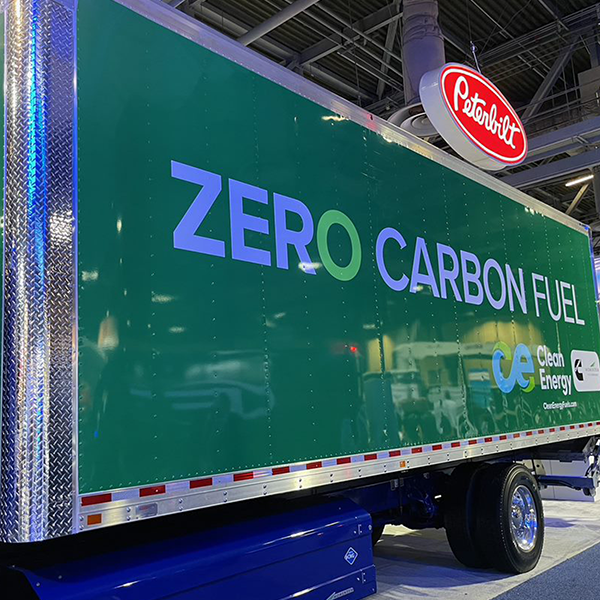September 30th, 2021 by Morgan Marketing

As attendees converged at this year’s Advanced Clean Transportation (ACT) Expo in Long Beach, California, JB Poindexter & Co was in full force at the event. Its business units’ Morgan and Morgan Olson bodies were featured prominently on the tradeshow floor, while EAVX sponsored a breakout session.
Throughout the four-day event, it became apparent that while there is plenty of momentum for EVs and businesses, commercial fleets need to proactively prepare themselves for changes driven by the adoption of clean transportation and vehicle technology.
“It’s clear there is a transition and acceleration of adopting electric vehicles in the commercial space, driven both by regulatory and sustainability concerns,” said Morgan’s Director of Marketing and Product Management Todd Breneiser. According to Breneiser, fleets need to determine their requirements and invest in charging infrastructure and understand the entire lifecycle of EV adoption, as “most have not fully assessed their needs and performed the due diligence needed to be successful.”
“Studies have shown that the total cost of ownership for switching to electric commercial vehicles is approaching parity,” Breneiser said, “As energy density increases, charging infrastructure is developed, and regulatory mandates are implemented, forward-looking fleet managers will have a robust adoption strategy in place.”
As of July 2021, there are about 42,000 public charging stations in the U.S., with the current administration proposing to have at least 500,000 private industry-built charging devices installed in the country by 2030 in April 2021.
The infrastructure challenges were highlighted in the EAVX-sponsored breakout session “Electrifying the Last Mile: An Opportunity Across Weight Classes,” headlined by BrightDrop CEO Travis Katz, Global Vehicles and FedEx Express Chief Engineer Boris Kort-Packard and EVgo CEO Cathy Zoi. The panelists presented their views on the importance of building charging infrastructure as battery-electric vans and medium-duty trucks become more prominent for last-mile deliveries.
FedEx has identified that by 2025, 50% of pickup and delivery vehicle purchases will be zero-emission EVs, increasing to 100% by 2030 to reach their carbon neutrality goal.
“To hear the insights on fleet electrification from FedEx in particular and how they’re addressing their goals to carbon neutrality was invaluable,” said EAVX’s Vice President of Business Development Jerry Kleinhenz.
Another major challenge most businesses must overcome to fully adopt EVs is government regulations. Many state and local governments are transitioning zero-emission fleets or even zero-emission operations, including California and New York. The latter signed into legislation in early September to have all new passenger cars and trucks sold in New York state to be zero emissions by 2035.
Morgan’s Senior Product Manager Brian Bradley highlighted transportation refrigeration units (TRUs) as an example – they would typically run off diesel or gas. But as of January 2021, the California Air Resources Board (CARB) announced plans to impose zero-emission requirements on truck, trailer, railcar and shipping container TRUs sold or operated in California.
“Regulations drive the product configurations that are needed to be compliant. Features that may not have been commonplace historically, but because of the regulatory environment, fleet managers will begin to invest,” Bradley said. “Adoption of fully electrified zero-emission TRUs will accelerate in select markets to meet the regulatory requirements, and as the costs come down, you will see widespread adoption nationally.”
Manufacturers are not at full-scale production yet due to the evolving regulatory and sustainability standards, according to Breneiser.
“Chassis OEMs, refrigeration unit manufacturers and commercial truck body integrators will ramp-up capabilities as the regulations are implemented, and the fleet orders reflect the new environment,” Breneiser said.
EV/APV technology, the increasing zero-emission regulatory environment and sustainability initiatives in public and private sectors are advancing. It is critical for JBPCO and its business units to understand and partner with customers and OEM chassis manufacturers to meet the marketplace challenges for business sustainability and future growth.
The JBPCO business units met with national fleet operators to understand the challenges they are experiencing and what they could do to support them better.
“The ACT Expo provided us to have valuable discussions with numerous key fleet operators in the United States, in addition to multiple chassis and technology partners,” Kleinhenz said.
Although Morgan did not exhibit or have a booth, their interaction with the attendees resulted in over 100+ truck bodies sales. Morgan and EAVX were able to meet with dozens of EV chassis manufacturers, customers and technology suppliers, sharing their vision and finding like-minded partners to develop a holistic and fully integrated offering for their customer’s changing requirements.
Interaction with chassis OEMs and fleet managers was critical. Morgan is applying its learning to a dedicated EV-focused engineering center to help fleets better prepare for the EV shift. The engineering center will develop new safety features, body construction techniques and further integration with electric OEMs leveraging the expertise of and in partnership with EAVX.
As the first major event JBPCO’s business units attended in-person since the pandemic, the ACT Expo was a true success in furthering the conversation around the innovation of EV. There is much work to be done, but JBPCO is proud to be a leader in the space.